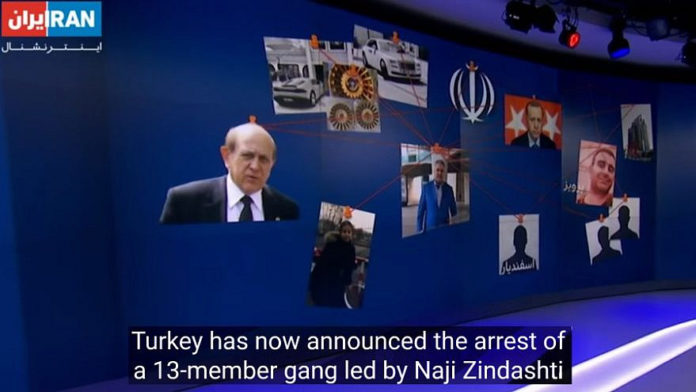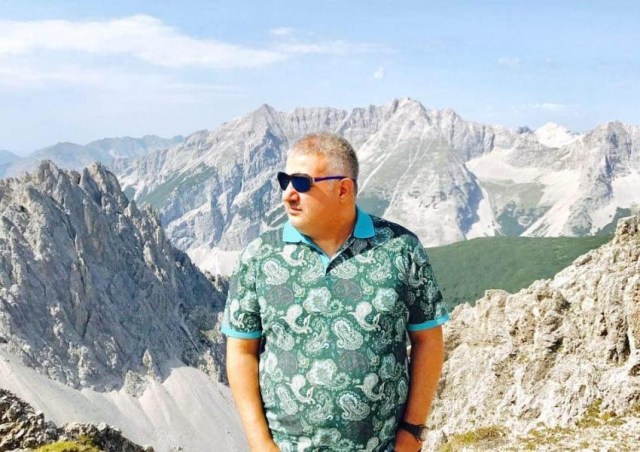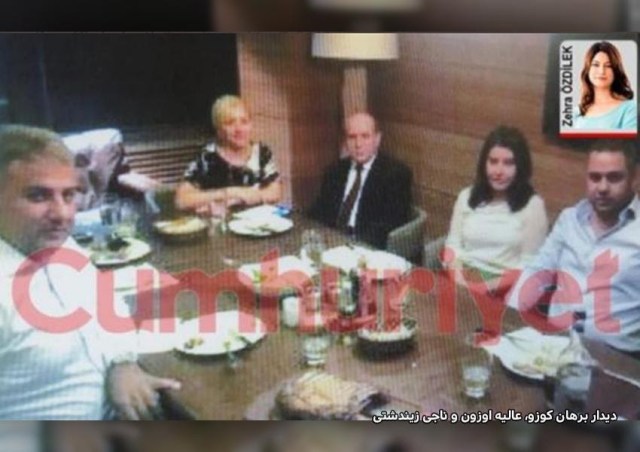

The secret of Iran’s intelligence “success”: its use of criminal organizations who kidnap exiled political activists and journalists around the world and transfer them to Iran for execution.
Several articles appeared recently in the Turkish, British and American media, dealing with Iran’s involvement with international crime. They indicate that Iranian intelligence is using major crime organizations and drug cartels to advance its goals, notably capturing dissidents in the diaspora. These organizations have affiliates in other countries. This includes Romania, a country where a senior Iranian judge was recently assassinated during a mysterious trip.
British and American news outlets reported that Turkish police recently arrested at least
13 members of an international crime cartel for collaborating with Iran’s intelligence services.
One such organization has become the long arm of Iranian intelligence. It is run by Naji Sharifi Zindashti, born in Oroumieh, Iran, the son of a Peshmerga fighter. Zindashti was detained in Evin prison after a conviction for drug trafficking at the age of 20 but escaped. He then lived in Turkey for many years and had contacts with Turkish politicians in President Erdogan’s AKP party. However, he also donated financially to the organization of Fethullah Gülen, the leader of the Turkish opposition in exile in the US.
Zindashti was reportedly a secret witness in the Ergenekon trial, and was detained on charges of attempting to topple the Turkish government. He was mysteriously released from prison in 2010 after his arrest in 2007 in Turkey for possession of 75 kg of heroin.
A “honeytrap”? The recent kidnapping by an Iranian “Swallow”
A video broadcast on Sky News on Dec. 16 portrayed the kidnapping in October of Habib Farajula Kaab, known as Habib Assyud in Turkey, in what the network called a “honeytrap.”
Assyud was vice president of the Executive Committee of the Arab Struggle Front for the Liberation of Ahvaz (ASMLA), a party working for the rights of Iran’s Arab minority. The Turkish Ministry of Justice issued a “Red Notice” from Interpol to arrest a woman named Sabreen Saeedi, (apparently a “Sununuh” or “Swallow” agent) for alleged involvement in the Assyud abduction.
The video footage showed Saeedi luring Assyud to fly from Sweden to Turkey and meeting him in a petrol station 80 km from Istanbul. He was then abducted by Zindashti’s gang and driven 1,600 km to Iran to stand trial.

Another Sununuh agent, Sherine Najaf, is suspected of luring dissident journalist Ruhollah Zam from Belgium to Iraq, where he was kidnapped. Zam was taken to Iran and executed by hanging on Dec. 12, 2020.


The kidnapping ringleader, Naji Sharifi Zindashti
In 2018, Zindashti and members of his gang were charged in Turkey with drug trafficking, the murder of another Iranian ex-pat named Saeed Karimian, the founder and director of JAM TV channels, and drug-related killings. They were soon released, apparently as a result of a combination of bribery, “lack of evidence” and political pressure from sources close to President Erdogan.


Exiled Iranian journalists working for Iran International television station in London reported they had received indications that Zindashti was also involved in the assassination of a senior Iranian judge, Gholamreza Mansouri, at a hotel in Romania’s capital in June 2020. According to the station, Zindashti passed an order from Iran to his cousin, Hossein Karimi Rickabadi, a well-known international criminal in Romania, to eliminate the judge, who held considerable information about the corruption of senior Iranian regime figures.
Mansouri’s death was ruled a suicide (he “jumped” from the fifth floor of his Bucharest hotel), but his family raised many questions about the cause of his death. They also questioned why Iranian diplomats instructed him to go from Germany to Romania after medical treatment in Germany. They claim his mysterious transfer to Romania happened to avoid assassinating him on German soil, which would have come at a high diplomatic, political and economic price for the Iranian regime.


(in tie). Source: Cumhuriyet.
Zindashti was also wanted in Greece in 2014 after the discovery of the largest shipment of heroin in European history. After the two-ton shipment was uncovered on a freighter, a series of mysterious murders took place in various countries. In September 2014, Zindashti’s 19-year-old daughter, Arzu Sherifi Zindashti, was shot dead in Istanbul. Zindashti’s partners in the drug deal found themselves on the receiving end of the mob boss’s rage. Media outlets in Turkey, Greece and other countries pointed the finger at Zindashti in connection with at least 10 murders.
After 13 years under surveillance in Turkey for killing his opponents, Zindashti apparently realized that returning to Iran would be safer. If he cooperated with Iranian intelligence, he could also run his Turkish operations from Iran, thus securing his future.
Zindashti’s murder and kidnapping spree
Many high-profile murders and abductions of Iranian exiles are attributed to Zindashti’s organization:
• On May 30, 2017, Saeed Karimian and his Kuwaiti partner, Mohammed Mutayeb Salihi, were killed in an attack on a private vehicle in Istanbul’s Sharir district. Turkey said that the assassin fled (presumably to Iran).
• On Nov. 14, 2019, Masoud Mulvey, founder of Telegram Black Box, which published information about Iranian intelligence, was murdered on a major street in Istanbul. According to Turkish security officials, the gunman was a gardener at Zindashti’s villa in Istanbul. The perpetrator was apparently arrested.
• On Oct. 23, 2020, Assyud was abducted from Turkey by the Zindashti gang and transferred to Iran. The crew, numbering 13 people, was recently arrested by Turkish security forces.
• In January 2019, Dutch Foreign Minister Stef Blok revealed his government’s secret service’s findings. They “had strong indications that Iran was involved in the assassinations of two Dutch nationals of Iranian origin.” He defined the Iranian actions as “blatantly damaging to Dutch sovereignty and completely unacceptable.”
The first victim was Ali Motamed, murdered near his home in Almere in December 2015. The second was Ahmad Nissi, an ASMLA official murdered in November 2017 in front of his home in The Hague. And Hezbollah maintains ties with Dutch criminal elements in various fields, including drug trafficking.
• In recent years, European intelligence services have uncovered—with the assistance of Israeli intelligence—several other attempts by Iran to target Iranian opposition activists on European soil.
• In 2018, Albania expelled Iran’s ambassador and another diplomat, who it claimed were involved in efforts to target opposition figures in the country. Then, in January 2020, Albania expelled another two Iranian diplomats for “endangering Albania’s national security.” The two were identified as an Islamic Revolutionary Guard Corps official and a member of the Iranian Intelligence Agency MOIS. They were reported to be associates of Quds Force commander Gen. Qassem Soleimani.
• In October 2018, Danish and Swiss officials uncovered an Iranian agent intent on assassinating an ASMLA activist in Copenhagen.
Iran’s intelligence services, including the Intelligence Ministry and IRGC (especially its Quds Force operating outside Iran), use various “covers” for their intelligence and terrorism activities. Iranian embassies, consulates and delegations traveling abroad cover for terrorist activities and intelligence gathering.
Iran uses Iran Air aircraft as well, for similar purposes. Iranian intelligence officials also turn to international crime and drug cartels (such as the attempt to murder the Saudi ambassador to the United States in 2011) to carry out assassinations and gather intelligence. And they use drug money to finance their activity, which hides official Iranian involvement.
As mentioned, mobster Zindashti relocated to Iran, where he lives a public life. He works openly with the Iranian Intelligence Ministry and, according to “informed sources,” runs his drug business.
Iran has claimed for decades that “unsung soldiers” of its intelligence services are deployed across the country and beyond. It is now clear that at least some of these “unsung soldiers” are operating through major crime and drug trafficking organizations.
It should be noted that despite Iran’s assassinations in European countries, those Western nations have maintained trade relations with it, while ignoring repeated human rights violations in Iran and global terrorist operations globally.
Even now, despite the sanctions imposed on the Iranian Intelligence Ministry, the European Union’s primary interest is to continue economic ties with Iran. This is despite pressure from human rights groups to make economic cooperation conditional on improving Iran’s human rights conduct.
Iran’s “Teflon shield” may provide more immunity ahead of U.S. President-elect Biden’s entry into the White House in January and the possibility of a U.S. return to the framework of the JCPOA nuclear agreement in 2021.
IDF Lt.-Col. (ret.) Michael (Mickey) Segall, an expert on strategic issues with a focus on Iran, terrorism and the Middle East. He is a senior analyst at the Jerusalem Center for Public Affairs and at Alcyon Risk Advisors.
This article was first published by the Jerusalem Center for Public Affairs.
(JNS).





